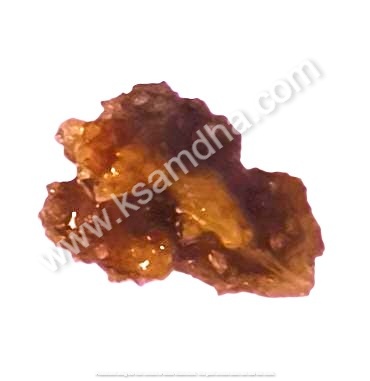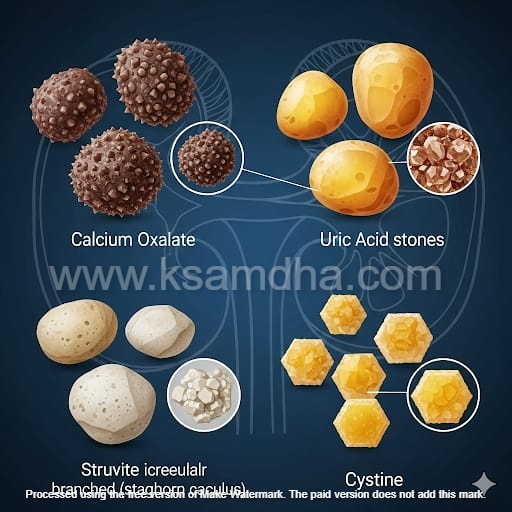Introduction
Kidney stones, also known as renal calculi or nephrolithiasis, are solid crystal deposits that form inside the kidneys or urinary tract. These stones develop when minerals and salts, such as calcium, oxalate, and uric acid, become concentrated in the urine and stick together. Kidney stones are a common health problem worldwide and can affect people of any age, though they are most frequently seen in adults aged 30 to 60 years. Kidney Stones Causes Symptoms Types Diagnosis Treatment and Prevention
Although kidney stones can be very painful, they are usually treatable. With lifestyle changes, dietary modifications, and proper medical care, most people recover fully. However, untreated stones can lead to serious complications such as urinary tract infections, kidney damage, and recurrent stone formation.
Kidney Stones Causes Symptoms Types Diagnosis Treatment and Prevention
This article explains what kidney stones are, their causes, symptoms, risk factors, types, diagnostic methods, treatments, and preventive measures in detail. https://ksamdha.com/how-to-control-sugar-level-naturally/

What Are Kidney Stones?
A kidney stone is a hard mass made of crystals that separate from the urine within the urinary tract. Normally, urine contains chemicals that prevent crystals from forming. However, when the balance of fluids, minerals, and salts in urine changes, crystals can develop.
Over time, these crystals may grow into larger stones. They may stay in the kidney or travel down the urinary tract. Small stones may pass without symptoms, but larger stones can block urine flow, causing severe pain and complications.
Causes of Kidney Stones
Kidney stones form due to an imbalance in the urine’s composition. Several factors contribute to stone formation, including:
1 – Dehydration
- The most common cause. Low water intake concentrates urine, allowing minerals to crystallize.
2 – Dietary Factors
- High salt intake increases calcium in urine.
- Excess protein can increase uric acid production.
- Oxalate-rich foods (spinach, nuts, chocolate) contribute to calcium oxalate stones.
3 – Medical Conditions
- Gout (increased uric acid).
- Hyperparathyroidism (high calcium levels).
- Urinary tract infections (UTIs) that encourage struvite stone formation.
4 – Genetics
- Family history of kidney stones increases risk.
5 – Obesity and Sedentary Lifestyle
- Metabolic changes can promote stone formation.
6 – Medications
- Some diuretics, calcium-based antacids, and certain antibiotics can increase stone risk.
Risk Factors for Kidney Stones
- Anyone can develop kidney stones, but certain risk factors make it more likely:
- Family history of stones
- Low fluid intake
- High-protein, high-salt, or high-sugar diet
- Chronic digestive diseases (Crohn’s, ulcerative colitis)
- Frequent urinary tract infections
- Obesity and metabolic syndrome
- Living in hot climates (due to dehydration risk)
Symptoms of Kidney Stones
- The symptoms depend on the size and location of the stone. Small stones may pass unnoticed, while larger stones can cause severe pain. Common symptoms include:
- Severe pain (renal colic) in the back, side, lower abdomen, or groin.
- Burning sensation during urination.
- Frequent urge to urinate but passing small amounts.
- Blood in urine (hematuria) – urine may appear pink, red, or brown.
- Cloudy or foul-smelling urine.
- Nausea and vomiting.
- Fever and chills (if infection is present).
- Pain usually comes in waves and can be extremely intense until the stone passes or is removed.
Types of Kidney Stones

There are four main types of kidney stones, each with unique causes and characteristics:
1 – Calcium Stones
- Most common type (80% of cases).
- Usually composed of calcium oxalate or calcium phosphate.
- Risk factors: high oxalate diet, low calcium intake, hyperparathyroidism.
2 – Uric Acid Stones
- Form when urine becomes too acidic.
- Common in people with gout, diabetes, obesity, or high-protein diets.
- May be hereditary.
3 – Struvite Stones
- Form due to chronic urinary tract infections.
- Contain magnesium, ammonium, and phosphate.
- More common in women with recurrent UTIs.
- Can grow very large and block the urinary tract.
4 – Cystine Stones
- Rare type caused by a genetic disorder called cystinuria.
- Cystine leaks into urine, forming stones.
- Often recurrent and difficult to treat.
Diagnosis of Kidney Stones
To confirm kidney stones, doctors use several diagnostic methods:
1 – Medical History & Physical Exam
- Assessment of symptoms, family history, and risk factors.
2 – Urine Tests
- Detect crystals, blood, infection, and chemical composition.
3 – Blood Tests
- Check calcium, uric acid, kidney function.
4 – Imaging Tests
- CT scan (non-contrast) – most accurate method.
- Ultrasound – safe and widely used, especially in pregnant women.
- X-rays (KUB film) – sometimes used but less accurate.
5 – Stone Analysis
- If a stone passes, it can be analyzed to determine its type and guide treatment.
Treatment of Kidney Stones
Treatment depends on the size, type, and severity of the stone. Options include:
1 – Small Stones (Can Pass Naturally)
- Drink plenty of water (2–3 liters/day).
- Pain relief medications (NSAIDs, acetaminophen).
- Alpha-blockers (like tamsulosin) to relax ureter muscles and help stone passage.
2 – Large Stones or Complicated Cases
- Extracorporeal Shock Wave Lithotripsy (ESWL)
- Uses sound waves to break stones into small pieces that can pass naturally.
- Ureteroscopy
- A thin scope is inserted through the urethra to remove or break stones.
- Percutaneous Nephrolithotomy (PCNL)
- A surgical procedure for very large or complex stones.
Complications of Kidney Stones
- If untreated, kidney stones may lead to:
- Recurrent urinary tract infections (UTIs).
- Blockage of urinary tract (hydronephrosis).
- Chronic kidney disease.
- Kidney damage or failure (rare but possible).
Prevention of Kidney Stones
Prevention is key to avoiding recurrence. Steps include:
1 – Stay Hydrated
- Drink at least 2–3 liters of water daily.
- Keep urine pale yellow or clear.
2 – Dietary Modifications
- Limit salt and processed foods.
- Moderate protein intake.
- Reduce oxalate-rich foods (spinach, beets, nuts, chocolate).
- Include adequate dietary calcium (dairy, fortified foods).
3 – Maintain Healthy Weight
- Prevent obesity and metabolic syndrome.
4 – Medications (if prescribed)
- Thiazide diuretics for calcium stones.
- Allopurinol for uric acid stones.
- Antibiotics for infection-related stones.
5 – Regular Check-Ups
- Monitor kidney health with periodic urine and blood tests.
Kidney Stones in Children
- Although less common, kidney stones can occur in children. Causes may include:
- Genetic conditions (cystinuria, hypercalciuria).
- Poor hydration.
- Metabolic disorders.
- Diet high in processed foods.
- Treatment and prevention strategies are similar to adults but require pediatric care.
Home Remedies for Kidney Stones (Supportive Care)
- While medical treatment is essential, some home remedies may support kidney health:
- Lemon juice: Contains citrate, which prevents calcium stone formation.
- Apple cider vinegar: May help dissolve stones (consult doctor first).
- Basil juice: Traditionally used for kidney health.
- Watermelon: Hydrating and may support kidney function.
- (Note: Always consult a healthcare professional before using home remedies.)
Frequently Asked Questions (FAQs)
- Q1. Are kidney stones dangerous?
Kidney stones are not usually life-threatening, but untreated stones can lead to complications like infections and kidney damage. - Q2. Can kidney stones pass on their own?
Yes, small stones (less than 5mm) often pass naturally with fluids and medications. Larger stones usually need medical treatment. - Q3. How painful are kidney stones?
Kidney stone pain (renal colic) is considered one of the most intense pains a person can experience. - Q4. Who is most at risk?
Adults aged 30–60, people with a family history, those with poor hydration, obesity, or high-protein diets. - Q5. Can kidney stones come back?
Yes. Once you have had a kidney stone, the chance of recurrence is high without preventive measures.
